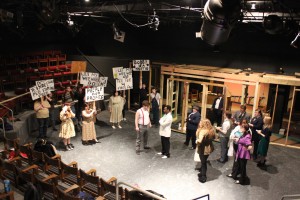“Urinetown: the Musical” offers cast and directors unique challenges

The entire cast facing off at the end of Act-1. Photo by Jon Quigley
By Jonathan Quigley
It’s that time again, time for the Waldorf Theatre Departments Musical performance. This year’s musical is “Urinetown the Musical” and is the first musical directed here by the staffs’ new member Marla Britton-Johnson.
“Urinetown is hard to explain mainly because the story is so strange, but the basic plot summary of the show is a kind of post apocalyptic society where there is a water shortage,” said Britton-Johnson. “So basically people have to pay in order to use the facilities, meaning like public toilets. Then there’s this company that is dividing the water, but they are also corrupt, which causes this group of individuals led by Bobby Strong to start a rebellion to make things better, or at least what they think is better. The writers are making fun of other musicals and musicals in general, and there are characters that will break away and talk about what makes a good musical.”
The process of producing a musical is a bit more time consuming and strenuous than producing a standard a theatrical production. Musicals require in depth choreography along with the addition of added time to fine tune the musical portion.
“A lot more work is put into a musical, so we have been doing planning for months in advance with designing, and I had to figure out how to do auditions and rehearsals. I also had to work with a music director and a choreographer and a pit, so it was a lot of people that I had to work with,” said Britton-Johnson. “Sadly we didn’t get the scripts until the actors got their scripts, so I had to devote all of my time to the script, which I don’t like to do. It’s a lot of work, but it’s ultimately worth it.”
The show’s music was directed by the Music Director at Emmanuel Church, Travis Beck. Beck was asked what it was like directing the music for Urinetown.
“Since the scripts and music didn’t get mailed to us when we had hoped, I had a lot less time to review the music before rehearsals began, so one of the first challenges was getting familiar with the music. I spent a lot of time listening to recordings online to get familiar with tempo, style, etc,” Beck said.
One of the challenges Beck faced were adjusting the music to fit the individual performers. While adapting the music is always difficult, Beck understands a much bigger problem.
“But probably the biggest challenge with this particular musical is being able to hear the dialogue, so I can cue the instrumentalists. We’re situated behind the cast, separated by enclosed walls, and some of the singers sing on a balcony that we’ve created for the show. All of that makes it very difficult to hear the cast and know when to move on to the next section of the song,” Beck said.
Although shows usually come with some stress, the outcome supersedes the challenges.
“All of these challenges are part of what makes the process of putting a musical together so worthwhile,” said Beck. “If it were easy from start to finish, it wouldn’t be nearly as satisfying to see it all come together at the end. The frustrations make the rewards that much greater.”
Lastly, Britton-Johnson got the chance to talk about the talent of the show.
“What’s fun about this show is there is a lot of variety with the Miami being there. There are real jazz-like songs, rap/rnb type of songs, a spiritual type of song; I mean it’s very up beat and peppy, but then there’s this dark edgy side. It’s not heavy but not light and fluffy either. The show is full of surprises and some of these people’s voices will surprise you,” Britton-Johnson said.

